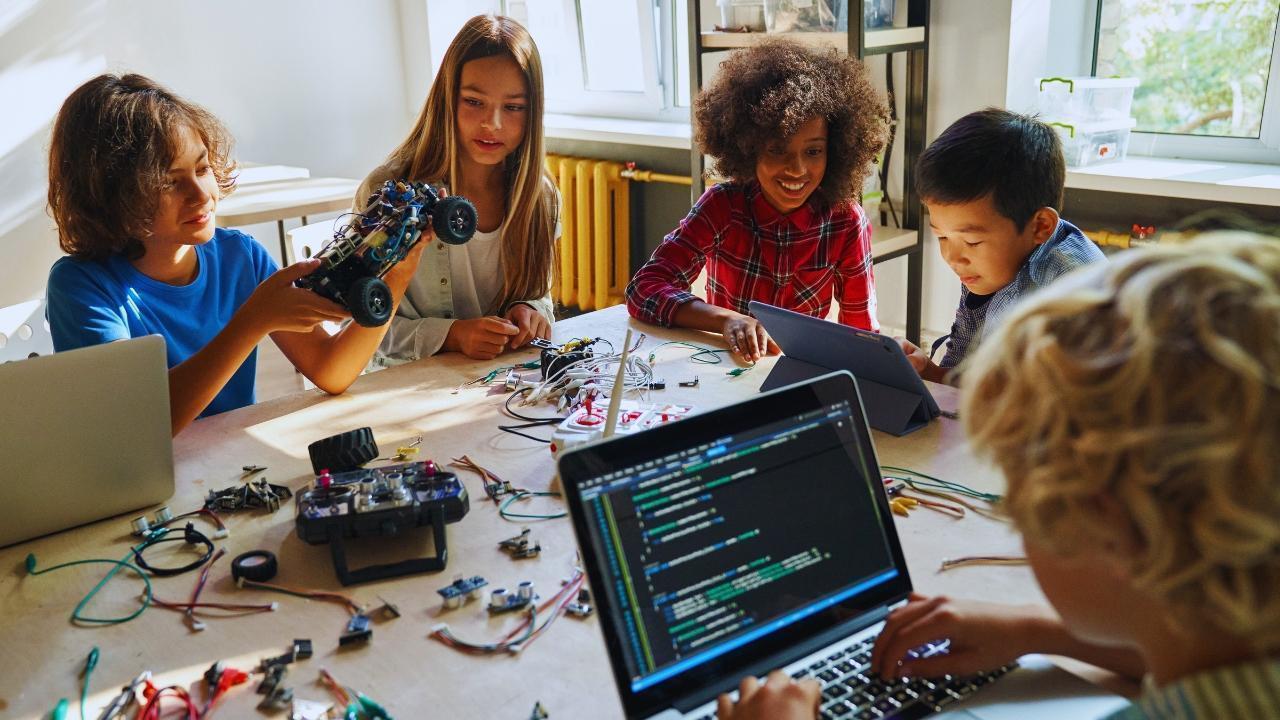
Post by : Anish
For centuries, education followed a familiar pattern — a teacher, a blackboard, rows of students, and textbooks. But in recent years, and especially after the pandemic, that model has started to shift. With the rise of artificial intelligence, online platforms, and self-paced learning, the traditional classroom is no longer the only place where learning happens.
Today, a 13-year-old in Nigeria can learn coding from an app powered by AI. A student in Vietnam can attend a virtual physics class taught by a digital tutor. Even primary school children in Europe are using personalized AI bots to improve their reading and math skills. This wave of smart technology has sparked a global conversation: Do students still need to go to school — or can AI do the job better?
Artificial Intelligence is no longer just a futuristic idea. It's already present in many learning environments. AI systems can now analyze a student’s strengths, weaknesses, and learning style, and then design a personalized curriculum. These platforms adjust in real-time, offering additional help where needed and skipping over content already mastered.
In countries like China and the U.S., AI tutors like Squirrel AI and Khanmigo are transforming how students study. These tools provide instant feedback, correct mistakes, and even offer encouragement. Teachers use AI to track performance, suggest improvements, and plan lessons more effectively.
In many ways, AI is helping students learn faster, smarter, and more flexibly than ever before.
There are clear advantages to AI-based learning systems:
Personalization: Every student learns at their own pace and style. AI adapts in real time, which human teachers can’t always manage in large classes.
Accessibility: Students in remote areas or underfunded schools can access high-quality content via smartphones and tablets.
Efficiency: AI tools can take over repetitive tasks like grading or quiz creation, giving teachers more time to focus on mentorship.
Cost-effectiveness: Once set up, AI platforms can deliver education at scale with fewer resources, making it attractive for governments and institutions.
These benefits make AI especially valuable in developing regions where there’s a shortage of trained teachers or infrastructure.
Despite its advantages, AI also has serious limitations. It can explain concepts and assess answers, but it cannot inspire, empathize, or build character. Learning is not just about absorbing facts — it’s about asking questions, building relationships, and understanding the world.
A human teacher can spot when a child is anxious, lonely, or confused — something AI still struggles with. Teachers create safe spaces, motivate students, and handle classroom dynamics that no algorithm can fully replicate.
Moreover, schools are more than just places to learn math or history. They are where students build friendships, learn social skills, and discover who they are. These human experiences are vital for personal growth — and they cannot be digitized.
In a world filled with content, the role of schools is changing from information delivery to meaning-making. Anyone can learn facts from YouTube. But understanding how to apply them, how to think critically, and how to navigate life — that still requires mentorship and guidance.
Schools are where values like teamwork, discipline, empathy, and leadership are taught — often indirectly through group projects, debates, and community activities. These soft skills are essential in the real world, whether you're a doctor, engineer, or artist.
If we reduce education to only test scores and performance data, we risk raising a generation that’s technically smart — but socially disconnected and emotionally unprepared.
Instead of asking whether AI will replace schools, a better question is: How can AI work alongside schools to improve education?
The future is likely to be a hybrid model — blending technology with traditional classroom experiences. AI can handle personalized lessons, track performance, and offer feedback. Teachers can focus on fostering creativity, collaboration, and emotional intelligence.
This model gives the best of both worlds: AI-driven efficiency plus human-centered growth. It also allows students to learn anytime, anywhere, without losing the support of a physical community.
In countries like Finland, South Korea, and Singapore, hybrid education is already becoming the norm. Schools are integrating AI into daily teaching, while still emphasizing art, outdoor learning, and peer interaction.
One concern with the growing use of AI in education is that it could widen the digital divide. Students in wealthy urban areas may benefit from cutting-edge technology, while those in rural or low-income communities could be left behind.
Without proper infrastructure, internet access, and training, AI may deepen existing inequalities instead of fixing them. To avoid this, governments and organizations must invest in inclusive technology policies — ensuring every child, regardless of background, has access to modern tools.
At the heart of this debate is a simple truth: students don’t just need knowledge — they need connection, support, and purpose. AI can assist with learning, but it can’t replace relationships or human understanding.
Parents, teachers, and policymakers must remember that education is not just about grades. It’s about raising kind, confident, and thoughtful individuals who can thrive in a rapidly changing world. Schools, in whatever form they take, should help nurture these qualities — not just produce test results.
The school of the future may look very different from the past. Desks might be replaced by virtual labs, and textbooks by apps. But the need for a shared learning space, guided by caring adults and filled with peer interaction, will remain.
AI will change how we learn — but not why we learn, or who we become through learning. As long as we value community, creativity, and compassion, schools will continue to play an essential role in shaping the next generation.
This article is published by DXB News Network for informational and editorial purposes. It does not endorse any specific education model or policy. Readers are encouraged to explore both traditional and emerging approaches based on context, resources, and educational goals.

The AI Voice Trap: Are You Talking to a Human Anymore?
As AI-generated voices become more convincing, the lines between human and machine communication are

Do Screens Steal Sleep? The Global Wake-Up Call on Digital Fatigue
With screen time at an all-time high, the world is facing an invisible epidemic: digital fatigue. He

Cardi B stuns in Rahul Mishra’s rose dress at Paris Fashion
Cardi B wore Rahul Mishra’s ruby red rose dress at Paris Fashion Week, showing love for Indian coutu

Integrated Resorts Set to Transform Tourism Experiences Across the Middle East and Beyond
Integrated resorts blending luxury, culture & entertainment are reshaping tourism in the Middle East

UAE launches AI-based Proactive Government Performance System
Sheikh Mohammed launches AI-powered system to improve UAE government performance, saving 250k hours

Plastic-Free in 30 Days: Real People Show That Zero-Waste Is Possible
From urban apartments to rural villages, individuals across the world are embracing the zero-waste l

Arab League Calls for Firm Action Against Islamophobia
Arab League chief calls Islamophobia dangerous, urging global action to study its roots and find sol

Alia Bhatt’s Ex-Secretary Held for Rs 77 Lakh Fraud Case
Alia Bhatt’s ex-secretary Vedika Shetty arrested for Rs 77 lakh fraud after forging Bhatt’s signatur

Dhurandhar First Look Sara Arjun Stars With Ranveer Singh, Fans React
Dhurandhar first look out now Sara Arjun teams up with Ranveer Singh. Bold casting choice surprises

Nora Fatehi Seen Crying at Mumbai Airport Fans Deeply Worried
Nora Fatehi breaks down in tears at Mumbai airport. Fans express concern after emotional post hints

Rome Gas Station Blast Injures 45 Two in Critical Condition
Massive explosion at a Rome fuel station injures 45, including police and firefighters. Two victims

DEWA, Google Cloud Partner to Boost AI in Daily Operations
DEWA teams up with Google Cloud to use AI for podcasts, cutting costs by 99% and making DEWA the wor

Canada removes digital tax to restart talks with US
Canada has decided to stop its digital tax plan. This move may help improve trade talks with the US.

Jannik Sinner and Aryna Sabalenka to compete in Wimbledon fight
Jannik Sinner and Aryna Sabalenka will face tough matches at Wimbledon. Both players are ready to fi

Etihad Airways’ 25% Fare Discount Offer Ending Soon
Etihad Airways is offering a 25% discount on flight tickets, but the deal is ending soon. Passengers